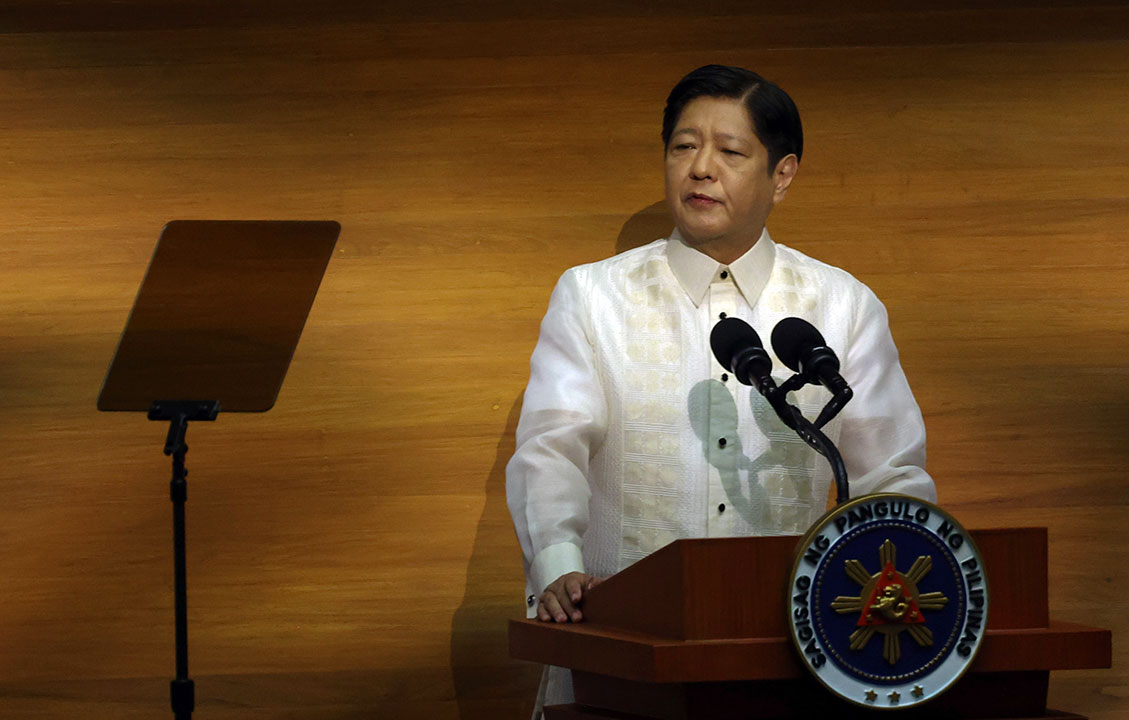




Inflation Update: Green light for easing
 DOWNLOAD
DOWNLOAD

December Economic Update: One for them, one for us
 DOWNLOAD
DOWNLOAD

Philippines Trade Update: Trade trajectories trend along
 DOWNLOAD
DOWNLOAD


Marcos renews push for more taxes

Philippine President Ferdinand R. Marcos, Jr. on Monday highlighted economic recovery from the pandemic in his second State of the Nation Address (SONA) and urged Congress to prioritize the passage of “essential” new tax measures.
Analysts, however, said the President had failed to mention new programs for struggling domestic sectors, including agriculture and manufacturing.
In a speech before a joint session of Congress, Mr. Marcos said his administration has succeeded in bringing down inflation, which he described as the “biggest problem encountered by the nation.”
“The inflation rate is moving in the right direction… What this means is that in spite of all the difficulties, we are transforming the economy. We are stabilizing the prices of all critical commodities,” he said.
From a peak of 8.7% in January, inflation has steadily eased to 5.4% in June but is still above the central bank’s 2-4% target.
Red-hot inflation pushed the Bangko Sentral ng Pilipinas (BSP) to raise borrowing costs by 425 basis points (bps) from May 2022 to March 2023.
Mr. Marcos said the Philippine economy is considered among the fastest-growing economies in Asia and the world, “a testament to our strong macroeconomic fundamentals.”
This year, the government is targeting 6-7% gross domestic product (GDP) growth, which Mr. Marcos said is supported by strong domestic demand.
“The economy is revived and rejuvenated, backstopped by a favorable enabling environment and the strong rule of law,” he said, adding that the “state of the nation is sound, and is improving.”
Mr. Marcos once again asked Congress to support his priority measures, including the excise tax on single-use plastics, value-added tax on digital services, rationalization of the mining fiscal regime, and the motor vehicle user’s charge, as well as the proposed reform of the pension system for military and uniformed personnel (MUP).
The Finance department earlier said continuing the current pension system for MUPs could lead to “fiscal collapse,” as accumulating pension liabilities might increase public debt by as much as 25% by 2030.
The President also pushed for a new government procurement law and state auditing code “to make government procurement and auditing more attuned to these changing times.”
Other priority measures cover Ease of Paying Taxes bill, proposed Anti-Financial Account Scamming bill, the proposed Tatak Pinoy bill, the Blue Economy bill, and Philippine Immigration Act.
Mr. Marcos also pushed for the institutionalization of the automatic income classification of local government units (LGU), as well as changes to the Fisheries Code, Anti-Agricultural Smuggling Act and Cooperative Code.
The President failed to mention the proposed amendments to the Bank Deposit Secrecy Law, which was included in the Legislative-Executive Development Advisory Council’s (LEDAC) list of 20 priority measures targeted for congressional approval by December. This measure is said to be key to Philippine efforts to get out of the Financial Action Task Force’s “gray list” by January 2024.
Agriculture
In his SONA, Mr. Marcos emphasized that the agriculture sector, which contributes 10% to GDP, is a priority.
“Our aim is to boost our local agricultural production — through consolidation, modernization, mechanization, and improvement of value chains — augmented by timely and calibrated importation, as needed,” Mr. Marcos said.
The President urged Congress to amend the Fisheries Code “to incorporate and strengthen science-based analysis and determination of fishing areas.”
Emy Ruth S. Gianan, an economics professor at the Polytechnic University of the Philippines, said Mr. Marcos failed to mention new programs for the agriculture and manufacturing industries, which she said are vital to increasing the Philippines’ production and make the country safe from imported inflation.
“We also did not hear about the Rice Enhancement Fund from the Rice Tariffication Law — how it was used and whether it was indeed helpful,” she said in a Facebook Messenger chat.
Maria Ela L. Atienza, a political science professor at the University of the Philippines, said this year’s SONA is similar to the one he gave last year except there were discussions on what the government has done.
“Some areas have a lot of details like the economy and agriculture, as well as infrastructure, digitalization and climate change, perhaps because there were more concrete actions in these areas, while other areas were given some sweeping, very general pronouncements or vague plans,” she said in a Viber message.
Ms. Gianan said what was clear during the President’s speech was the importance and contribution of the digital economy.
“But we need to dissect this,” she said. “What kind of jobs are available to Filipinos in the digital economy, and could there be room for greater growth if only we’ll attract more sophisticated tech industries and upskill our workforce?”
Mr. Marcos said the digital economy contributed P2 trillion to the Philippine economy in 2022, which was equivalent to 9.4% of the country’s GDP.
The President also focused on his P8.3-trillion infrastructure plan, which he said is “being vigorously implemented.”
“The flagship projects cover investments in the areas of physical connectivity, water resources, agriculture, health, digital connectivity, and energy,” he said, noting that physical connectivity infrastructure such as roads, bridges, seaports, airports, and mass transport accounted for 83% of the program.
“Our infrastructure spending will be at 5 to 6% of our GDP.”
Mr. Marcos said some of the priority projects “can now look to the newly established Maharlika Investment Fund without the added debt burden.”
“In pooling a small fraction of the considerable but underutilized government fund, the fund shall be used to make high-impact and profitable investments such as the ‘Build, Better, More’ program,” he said. “The gains from the fund shall be reinvested into the country’s economic well-being.”
Terry L. Ridon, convenor of InfraWatch PH, said while Mr. Marcos cited an “impressive listing” of infrastructure projects, there is a lack of clarity on the primary objective of the Maharlika Investment Fund (MIF).
Mr. Ridon said if the MIF’s primary objective is to make high-impact and profitable investments, “it means that it should only participate in ‘Build, Better, More’ projects with indisputable commercial outcomes, such as airport, railways and various power projects.”
“However, this will also mean that the MIF will ultimately compete with private sector capital in vying for the various available projects under public-private partnership projects,” he said.
“If this is the President’s direction, this might dampen private sector and foreign investor appetite to participate in various flagship and commercially viable public-private partnership projects, as the cloud of government power will hang over these commercial transactions.”
Enemy of no one
During his speech, the President also touted his foreign policy — “a friend to all and enemy of none ” — that he said has proven effective.
He said his government would continue to forge more of these international partnerships that will lead to a more balanced trade strategy and a healthier economic position.”
The President touted his foreign trips that have yielded P3.9 trillion in investment pledges and are expected to generate 175,000 jobs for Filipinos.
“We hear these numbers but how adequate are these measures? What are the institutional structures that ensure that the targets are going to be achieved?” Leonardo A. Lanzona, who teaches economics at the Ateneo de Manila University, said via Messenger chat.
Meanwhile, Mr. Marcos vowed to prioritize the recovery of the education sector and boost the Philippine labor force.
The President also said his government continues “to exhaust all efforts” to boost programs for alternative learning, nondiploma courses or technical-vocational education and training.
“The bane of the mismatch between jobs and skills among our workforce is being rectified through strengthened government-industry-labor-academe partnerships, and continuous reskilling and upskilling training programs,” he added.
Ms. Atienza also lamented the President’s failure to highlight how corruption and the lack of good governance reforms continue to affect the delivery of public services.
“He talked about forcing the resignation of police officers involved in drugs and other unethical behavior but did not discuss how to encourage trustworthiness in government service,” she added.
‘HIGHLY ENCOURAGED’
The European Chamber of Commerce of the Philippines (ECCP) said in a statement it is “highly encouraged” after the SONA since Mr. Marcos mentioned efforts to reduce inflation and promote industry development.
“While the P3.9-trillion total investment pledges with the potential to generate 175,000 jobs is indeed promising, we look to the government to further solidify the country’s position as an attractive investment destination through incentive schemes and the proper implementation of green lanes to boost the country’s competitiveness and facilitate ease of doing business,” the ECCP said.
Philippine Chamber of Commerce and Industry President George T. Barcelon said Mr. Marcos’ speech showed he is clearly prioritizing agriculture and showed no sign he would step down as Agriculture secretary.
“I think he is very focused on the agriculture sector. He did not give any hint on anybody (as a replacement),” he said in a mobile phone message.
Management Association of the Philippines President Benedicta Du-Baladad welcomed the President’s initiatives on addressing malnutrition, low level of education and employment, among other things.
“We urge the government to continue taking steps to further narrow the income disparity and ensure that economic gains redound to a more equitable distribution of wealth across the board,” she said in a statement.
British Chamber of Commerce Philippines Executive Director Chris Nelson said that the business chamber is satisfied with the SONA, which mentioned plans to improve the ease of doing business in the country.
“I was pleased to know that Mr. Marcos referred to the ease of doing business, which is one of the key points, as well as the green lane for strategic investments,” Mr. Nelson said via mobile phone interview.
“We want to see this continuing. We need to keep that momentum going forward,” he added.
Federation of Philippine Industries Chairman, Jesus L. Arranza, who also chairs the Fight Illicit Trade group, said in a mobile phone interview that the SONA was “very comprehensive” as it mentioned efforts against agricultural smuggling.
“By and large, the SONA was very comprehensive. He touched all points. He is only one of the few presidents that have mentioned efforts against smuggling and illicit trade,” Mr. Arranza said.
Meanwhile, Foreign Buyers Association of the Philippines President Robert M. Young said in a Viber message that Mr. Marcos could have given more emphasis on the country’s export industry during his SONA.
“The export industry should have been given focus, especially the ailing sectors such as apparel and textile which can generate and contribute the needed dollar revenues for our big national debt payment, and the job creation for the marginalized countrymen,” Mr. Young said. — Kyle Aristophere T. Atienza and Revin Mikhael D. Ochave
This article originally appeared on bworldonline.com





 By BusinessWorld
By BusinessWorld